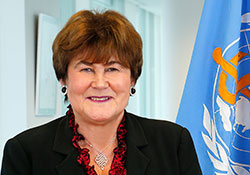European Immunization Week – statement by Zsuzsanna Jakab, WHO Regional Director for Europe

WHO/Franz Henriksen
20 April 2015
European Immunization Week celebrates its tenth anniversary this year, so now is the time to look back on the incredible achievements of the past 10 years in the control of vaccine-preventable diseases in the WHO European Region. It also provides an opportunity for reflection on the collective challenges and opportunities that lie ahead. This year's theme – commitment to vaccination – captures the importance of continued engagement at all levels of influence, from the political and professional to the personal.
European Member States demonstrated such commitment by unanimously adopting the European Vaccine Action Plan in 2014, providing a roadmap for 2015–2020. This was just one of the many notable achievements of the past 10 years. With Member States and partners, we at WHO/Europe celebrate the Region's continuing polio-free status, the interruption of endemic transmission of measles in 22 European countries and rubella in 23, and the critical establishment of national technical advisory groups on immunization in 42 Member States. We also celebrate the continuing development of vaccine technologies, which has allowed all Member States to introduce one or more new vaccines to tackle previously unaddressed diseases, including pneumococcal disease and those related to rotavirus, human papillomavirus (HPV) and Haemophilus influenzae type B infection.
While we celebrate these successes, we also recognize that they are not enough. Over 6000 cases of rubella and over 16 000 cases of measles were reported in the European Region in 2014; and several countries started 2015 with continuing measles outbreaks. Despite high immunization coverage at the national level, pockets of underimmunization in each country provide these and other serious diseases with opportunities to spread. Closing these immunization gaps has become more urgent, but also more difficult, as the elimination of measles and rubella draws closer. The message of European Immunization Week is clear: maintaining commitment to the Region's immunization goals is now more important than ever.
The world has changed in the last 10 years, and we and our partners must change along with it. Increasing globalization means easier and more frequent movements of both populations and diseases. Each outbreak of a vaccine-preventable disease in the European Region highlights common vulnerabilities and the importance of strengthening European surveillance and health systems.
Each year, European Immunization Week offers a platform for training, advocacy, the raising of awareness and the promotion of immunization. During the Week, professionals and volunteers, national authorities and health workers, parents and children will demonstrate their commitment by spreading the message that vaccines save lives. I extend my appreciation and support for these efforts to protect the health of everyone living in the WHO European Region.
Congratulations on 10 years of great success, and best wishes for the decade to come.



